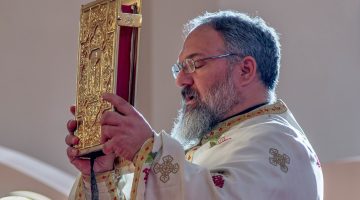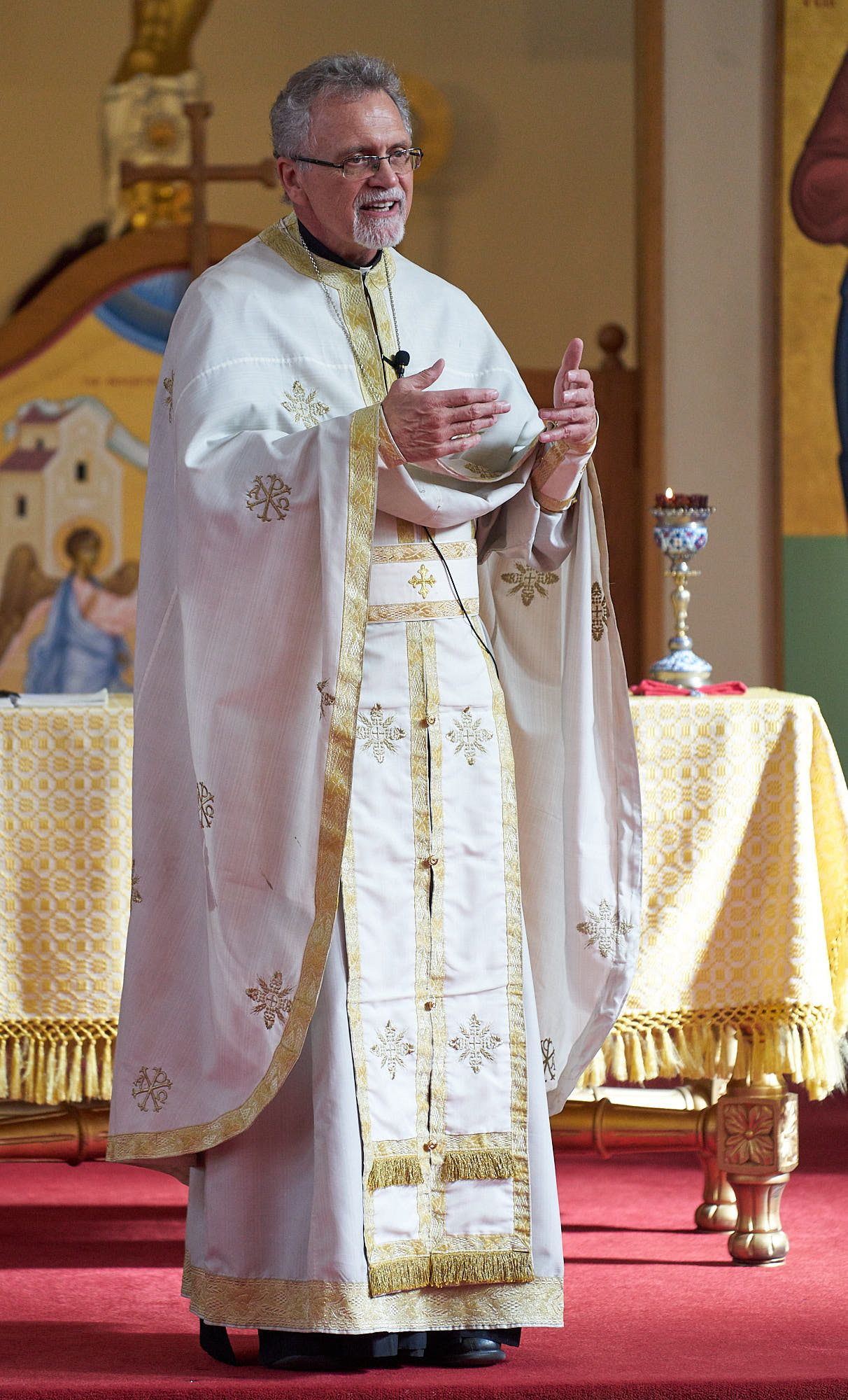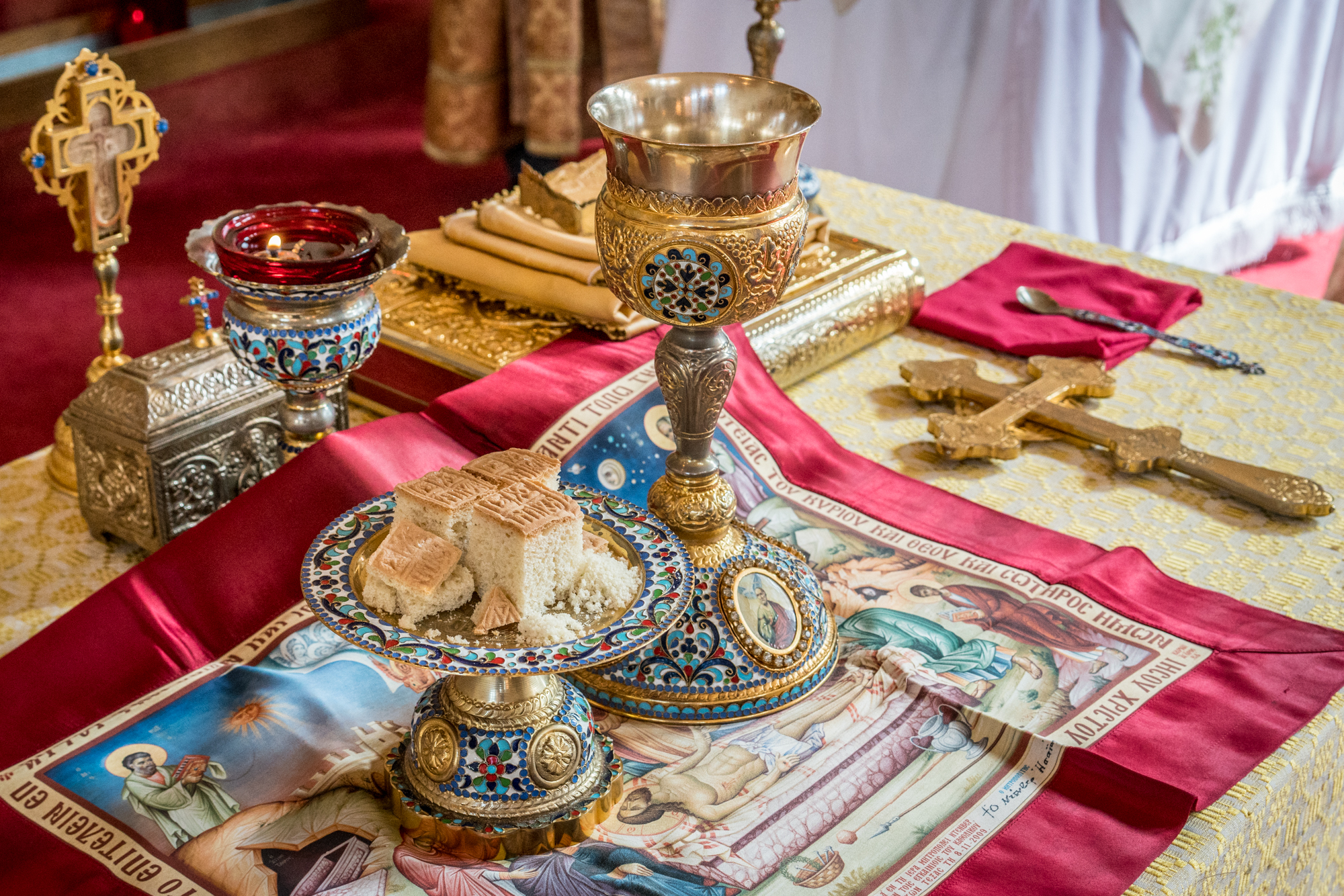As we resume our Liturgy Survival Guide [see the previous post from February here], we will focus on the epistle and Gospel readings and the homily. These are the final sections of the Liturgy of the Word, the first leg of our journey into the Kingdom. The road then continues with the Liturgy of the Faithful and our destination, the Eucharist.
[Quotations in this post are from the valuable book, Let Us Attend! A Journey through the Orthodox Divine Liturgy by Fr. Lawrence Farley.]
The Epistle
After the musical theology of the Divine Liturgy has prepared us for the reading of the Scriptures, the deacon cries out, “Wisdom! Let us be attentive!” We listen, ready for the timeless, sacred words of one of the epistles from the New Testament.
But listening, truly listening intently, can be difficult. We have become numbed to words. Our lives are filled with them—books and magazines have been available to the common people for a few hundred years, followed by spoken words available 24/7 through radio and television in the twentieth century. Now in the twenty-first century we also have access to podcasts, streaming videos, and social media. Our days are filled with chatter, much of it is mindless and destructive. Modernity possesses a wealth of words and a poverty of spirit.

Because of the constant noise surrounding us, it is difficult to imagine the eagerness that Christians must have felt as they anticipated the scripture readings in the early centuries of the Church. In 331 AD, when Emperor Constantine ordered copies of the Bible to be made for the growing number of churches in the city of Constantinople, he commissioned Eusebius of Caesarea to prepare fifty of them.
Fifty. That’s it. Fifty Bibles for the entire city.

Back then, the words were hand-copied onto a papyrus scroll or codex (the early form of books) by scribes, and only the wealthy could own books. This reality, combined with low literacy rates, meant that the scriptures were available to the people only in church.
Thus the Bible was treasured, and long passages were read aloud during the service. To provide a break from all that listening, between readings the Church inserted a psalm verse, called a prokeimenon (“that which lies before”), to be chanted by the reader then repeated by the people.
But the chanted refrain before the Gospel reading is an expression of joyful anticipation still used today. We sing “Alleluia, alleluia, alleluia” before hearing the “red letter” passages—the words of Jesus.
The Gospel Reading and the Primacy of Jesus’ Words

The Gospel passage is the final reading, because in the Liturgy of the Word the Church has saved “the best for the last, the good wine until the end” (John 2:10; Farley, p. 39). Before the Gospel passage is chanted, the priest prays a prayer for understanding and for transformed lives as we hear Jesus’ words. (This is a wonderful prayer to use before personal Bible reading too. I have printed it at the bottom of this post.)
When we listened to the epistle reading, those of us who worship in churches with pews remained seated. But we rise for the words of the Gospel, “like soldiers standing at attention before their commander” (Farley, p. 43). As Jesus taught, “Heaven and earth will pass away, but My words will by no means pass away” (Matt. 24:35). His words are preeminent over all others, and with our bodies and voices we proclaim our allegiance to Christ, singing “Glory to You, O Lord, glory to You!” before and after the reading.
The Homily

In most parishes, the priest or bishop concludes this scriptural portion of the liturgy with a sermon known as the homily. In my parish, the priest or deacon gathers the children for a special sermon, and the homily for the older parishioners is often saved for the end of the liturgy. (This is so that the children can receive the Eucharist and then be dismissed for church school; customs vary according to local needs.)
The homily differs from the sermons in many Protestant churches in that it is not the highlight of the service. In fact, the homily, unlike the words of Scripture themselves, is not a mandatory part of the liturgy. Sometimes a priest might leave it out of the service because of other things going on in the life of the parish.
In my Protestant past, the pinnacle of Sunday morning worship was the sermon. We affirmed the importance of gathering, praying, and singing together, but the greatest emphasis was on “preaching the Word.”
The Word of God is also cherished in the ancient Orthodox Faith, but its reading and proclamation is not the summit of our journey of worship.
Our Journey’s Destination: The Eucharist
Our Orthodox liturgical journey is much like a trek up Grays and Torreys Peaks in Colorado. Hikers who hope to scale all of the “fourteeners” (mountains that are at least 14,000 feet above sea level) in the Rocky Mountains often begin here, because these two peaks are connected by a saddle of land. Torreys Peak is an integral part of this hike, but it is not the highest point. Grays is the true summit.
Just as Torreys is not the high point of this hike, the Bible—its reading and proclamation—is not the central point of the Divine Liturgy. We prepare ourselves for the reading of the scriptures, and those scriptures in turn serve as preparation for the second leg of the journey, the Liturgy of the Faithful, and its summit, the Eucharist.

The importance of the Eucharist, served at every Divine Liturgy (celebrated on Sundays and frequently on weekdays and Saturdays), cannot be missed. Its centrality—its inescapability—can be jarring for those of us from heterodox backgrounds who communed infrequently and even casually in the past.
With the Scripture readings and the homily, we completed the first leg of our liturgical journey, the Liturgy of the Word. Next, in the Liturgy of the Faithful, we will hike to the summit in our ascent to the Kingdom of God—receiving Christ’s Body and Blood in the bread and wine of the Eucharist. The written Word of God is a vital part of this ascent, but the presence of the Living Word of God, Christ Himself, is our destination.

#
Prayer Before Reading God’s Word
Illumine our hearts, O Master who loves mankind, with the pure light of your divine knowledge. Open the eyes of our mind to the understanding of your gospel teachings. Implant also in us the fear of Your blessed commandments, that trampling down all carnal desires, we may enter upon a spiritual manner of living, both thinking and doing such things as are well pleasing unto You.
For You are the illumination of our souls and bodies, O Christ our God, and unto You do we ascribe glory, together with Your Father, who is from everlasting, and Your all-holy, good, and life-creating Spirit, now and ever and unto ages of ages. Amen.
#
You can find this prayer and others in a free app called the “Pray Always” Orthodox Christian Prayer Book, available in the App Store for iPhones and on Google Play for Android phones. The icon for the app looks like this:

